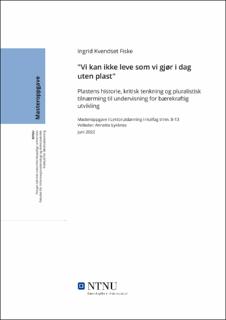| dc.contributor.advisor | Lykknes, Annette | |
| dc.contributor.author | Fiske, Ingrid Kvendset | |
| dc.date.accessioned | 2022-07-23T17:21:45Z | |
| dc.date.available | 2022-07-23T17:21:45Z | |
| dc.date.issued | 2022 | |
| dc.identifier | no.ntnu:inspera:104871035:32266813 | |
| dc.identifier.uri | https://hdl.handle.net/11250/3008065 | |
| dc.description.abstract | Denne studien har to formål. Det første formålet er å undersøke hvilke oppfatninger elever har om plast i samfunnet etter å ha lært om plastens historie. Det andre formålet er å se hvordan et undervisningsopplegg som setter søkelyset på flere sider ved plast kan bidra til kritisk tenkning og pluralistisk tilnærming til undervisning for bærekraftig utvikling.
Til studien ble det laget et undervisningsopplegg der målet var å gi elevene et innblikk i plastens betydning for samfunnet gjennom å høre om plastens historie, og i tillegg legge til rette for diskusjoner om plast fra flere perspektiver. Studien ble gjennomført i en naturfagklasse ved VG1 studieforberedende. For å få innsikt i hva elevene mente om plast ble det tatt lydopptak av gruppediskusjoner og gjennomført intervju.
Resultatene fra studien viser at elevene hovedsakelig oppfattet plast som noe positivt og viktig i dagens samfunn, men at håndteringen av plast etter endt bruk skaper problemer. Elevene mente at plast var vanskelig å erstatte på grunn av dens gode egenskaper og lave pris, som har bidratt til økonomisk vekst og bedre livskvalitet for mange. Videre mente elevene at plast har blitt et stort miljøproblem på grunn av forsøpling, og derfor bør man prøve å redusere plastforbruket. Elevene mente at plast ikke burde fjernes på områder hvor plast bidrar til at mennesker lever lengre, som for eksempel i helseindustrien der plast har blitt et viktig materiale i medisinsk utstyr. Andre områder hvor elevene mente plast ikke burde erstattes var områder hvor plast har en positiv effekt på miljø, samfunn eller økonomi og som mennesker er avhengige av hver dag, som for eksempel transportmidler som inneholder plastdeler.
Et av målene med undervisningsopplegget var at elevene skulle få mulighet til å utvikle pluralistiske holdninger og trene ferdigheter og anlegg i kritisk tenkning. Elevene viste pluralistiske holdninger og kritisk tenkning ved å diskutere plast fra miljø-, samfunns- og økonomiske perspektiver, og foreslå og vurdere løsninger som ivaretar bruken av plast og samtidig reduserer miljøpåvirkningene plastavfall kan gi. Videre viste elevene pluralistiske holdninger og kritisk tenkning ved å reflektere over egne meninger og vise innsikt i begrensninger ved egen kunnskap. Resultatene fra studien viser derfor at et undervisningsopplegg som setter søkelyset på flere sider ved plast, kan gi elevene et repertoar til å diskutere plast på en slik måte at de demonstrerer kritisk tenkning og pluralistiske holdninger. | |
| dc.description.abstract | The aim of this study is twofold. The first aim is to investigate students´ perceptions of plastic in society after learning about the history of plastics. The second aim is to investigate how a teaching module which highlights different perspectives of plastics can lead to critical thinking and a pluralistic approach in teaching for sustainable development.
In this study, a teaching module was developed aiming at offering the students´ insight into the history of plastics and facilitating discussions of plastics from different perspectives. The study was conducted in a science class in high school. Group discussions were audio recorded and interviews were conducted to get insights into the students´ opinions of plastics.
The result from the study shows that the students thought of plastic as something positive and important, but that the handling of plastics afterwards is problematic. The students thought plastics are difficult to replace because of their properties and low costs, which have contributed to economic growth and better life quality for many people. The students also thought that plastic consumption should be reduced because of plastic pollution. In the students´ views, plastic should not be limited in areas where plastics are important for human health like in medical equipment made of plastics. Furthermore, the students did not want to restrict the use of plastics in areas where humans are dependent on plastics in everyday life, and where they have a positive effect on the environment, society or economics, like in transportation vehicles.
One of the teaching module´s goals was to create opportunities for the students to develop pluralistic attitudes and train skills and dispositions in critical thinking. The students displayed pluralistic attitudes and critical thinking by discussing plastic from environmental, social and economic perspectives, and suggesting and evaluating solutions to maintain the use of plastics while also reducing the environmental impact of plastics discarded in nature. Furthermore, the students displayed pluralistic attitudes and critical thinking by reflecting on their own attitudes and recognizing limitations to their own knowledge. Therefore, the study suggests that a teaching module which highlights different perspectives of plastic can give the students a repertoire to discuss plastic in such a way that they display critical thinking and pluralistic attitudes. | |
| dc.language | nob | |
| dc.publisher | NTNU | |
| dc.title | Vi kan ikke leve som vi gjør i dag uten plast | |
| dc.type | Master thesis | |
